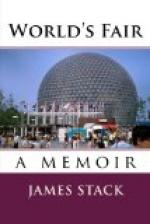The forests, in France, are very extensive; and as wood is the general fuel used, great attention is paid to the growth of the trees. Cattle and domestic animals are rather scarce, and the sheep are ill-managed; in winter, they are fed on straw and hay, instead of green food, so that the French meat is not so good as the English; but they have a nice way of dressing it. The country people are very simple in their habits and manners, and very frugal in their way of living; they live for the most part on black bread, garlic, fruit, and milk. The costumes of some of the peasants are exceedingly pretty.
[Illustration]
What a many thousand contributions have come from foreign countries, yet even a greater number have been sent in from all parts of our own dear islands, England, Ireland, and Scotland. Here is a silver tea-kettle, manufactured from a fourpenny-piece, by a working man. I think that would grace the diminitive tea-table of the Emperor of the Lilliputians. And a pair of boat-sculls, made of white ash, and only the size of writing-pens, which I dare say, the oars of the King of Blefuscan’s barge resembled; these, with a magnificent oar, thirty-six feet long, are intended as presents for His Royal Highness the Prince of Wales.
Here is a scarf, containing twelve miles and a-half of thread, three millions four hundred and seventy-five stitches, is nine feet ten inches long, three feet wide, and weighs only five ounces and a-quarter;—that came from Ireland. Look, too, at that beautifully embroidered dress; it came from Ireland, and is worth seventy-five guineas.
There are many little models of different buildings; and there is a colossal horse and dog; and two gigantic statues; and there is a nicely carved oak chair, made by an English ship-carpenter; and here are cotton stockings, manufactured so fine, that they look exactly like silk. There are also models of carriages, ships and machinery; a magnificient epergne of glass, with some large pearls, from Ireland. A beautiful piece of sculpture, representing the Scottish games, is the most remarkable contribution which has come from Scotland.
The English people are celebrated for their industry and perseverence; they manufacture numerous things, and carry on a alrge commerce with other countries. The industry of the peasants have made the soil produce wheat, barley, rye, oats, beans, potatoes, turnips, hops, hemp and flax. Nearly every variety, of vegetables, and a great number of fruits, are also grown. There is abundance of timber, which is used for many purposes; the oak tree is chiefly employed for building ships. The ships of war are called the “wooden walls of England.”
The domestic animals are taken great care of; sheep and hogs, when killed, are made into mutton, pork, bacon, and ham. The English cheese and butter is superior to any other. There are abundance of mineral treasures found in various parts of the kingdom; indeed, the English people are greatly indebted to the well-worked mines for their wealth. At the Exhibition, are several specimens of ores.




